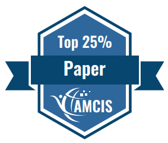Healthcare Informatics & Health Information Technology (SIG Health)
Loading...
Paper Type
Complete
Paper Number
1727
Description
The application of Convolutional Neural Networks (CNNs) for medical image classification and segmentation tasks is well-known and highly utilized in deep learning architecture. Digital transformation of healthcare services and technology has presented huge opportunity for new technologies to be investigated. However, analysis of these CNN models for task-specific selection presents an opportunity for additional research. Further, given the plethora of cloud computing-based services, the computational cost has become a crucial factor for model selection. In this paper, we compare the state-of-the-art CNN models in terms of accuracy and cost. A two-stage adaptive transfer learning model framework is designed based on Design Science principles. Our experimental results show that the ResNet50 CNN model has performed well and yielded 80.26% validation accuracy and 47.13% validation loss. The framework could be useful as a decision support tool for medical professionals in medical image classification.
Recommended Citation
Basyal, Ganga; Zeng, David; Bishop, Dave; and Rimal, Bhaskar P., "Comparative study of CNN models for brain tumor classification: Computational efficiency versus accuracy" (2021). AMCIS 2021 Proceedings. 28.
https://aisel.aisnet.org/amcis2021/healthcare_it/sig_health/28
Comparative study of CNN models for brain tumor classification: Computational efficiency versus accuracy
The application of Convolutional Neural Networks (CNNs) for medical image classification and segmentation tasks is well-known and highly utilized in deep learning architecture. Digital transformation of healthcare services and technology has presented huge opportunity for new technologies to be investigated. However, analysis of these CNN models for task-specific selection presents an opportunity for additional research. Further, given the plethora of cloud computing-based services, the computational cost has become a crucial factor for model selection. In this paper, we compare the state-of-the-art CNN models in terms of accuracy and cost. A two-stage adaptive transfer learning model framework is designed based on Design Science principles. Our experimental results show that the ResNet50 CNN model has performed well and yielded 80.26% validation accuracy and 47.13% validation loss. The framework could be useful as a decision support tool for medical professionals in medical image classification.
When commenting on articles, please be friendly, welcoming, respectful and abide by the AIS eLibrary Discussion Thread Code of Conduct posted here.



